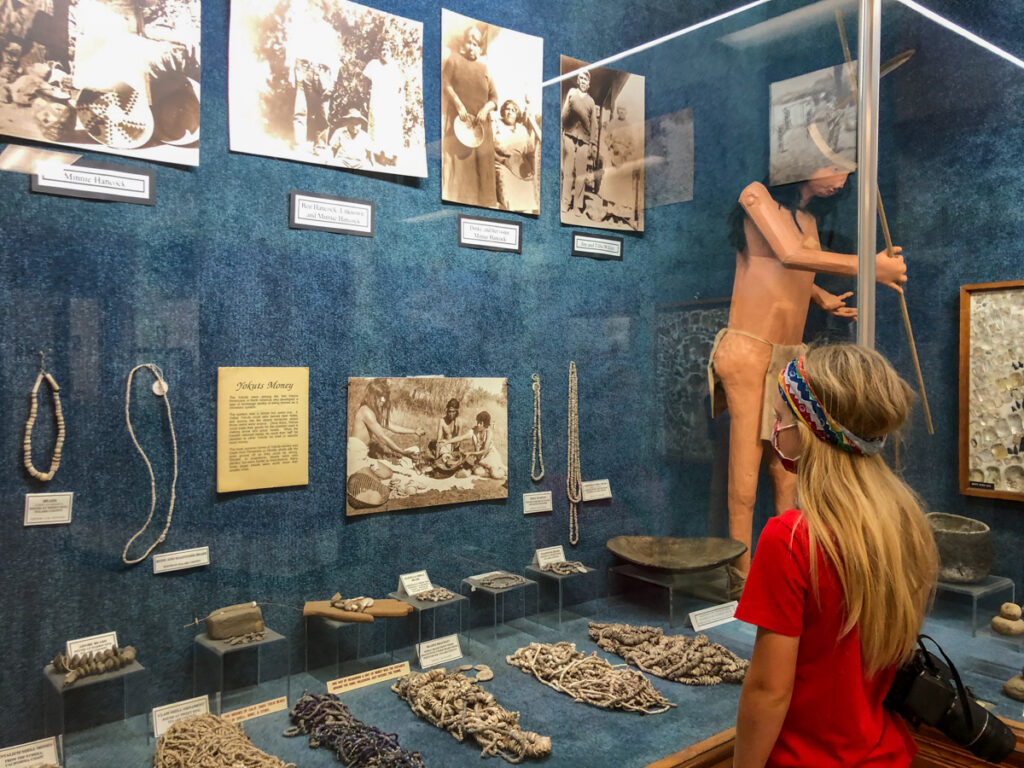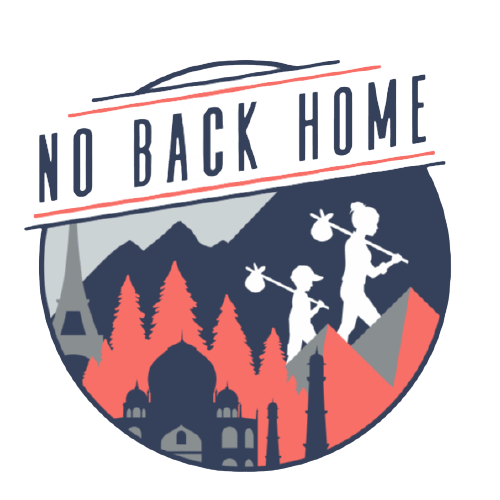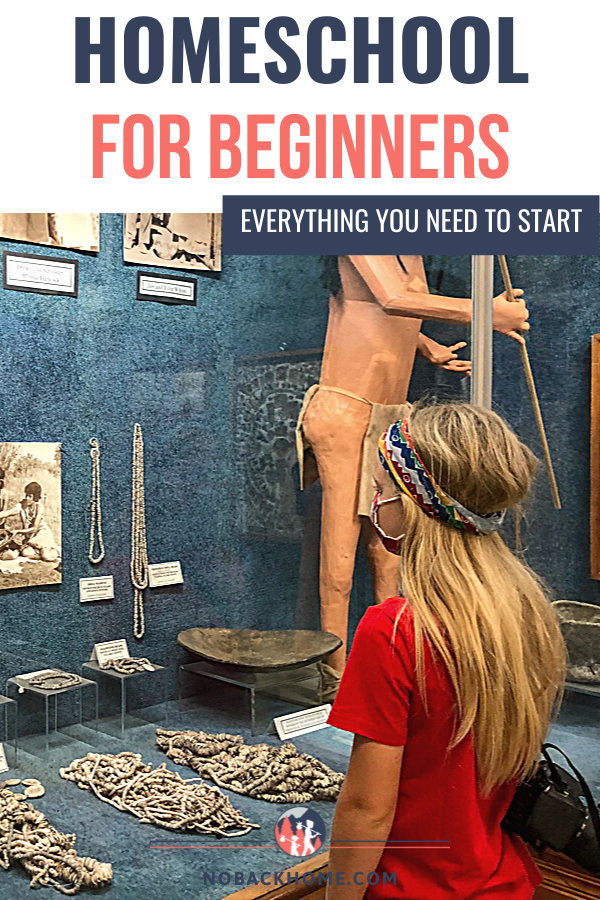Homeschooling has become more popular these past few years due to the pandemic, so I thought I would share more about our homeschool journey, including the whys and hows of what we do. – in essence homeschooling for beginners! To be honest, I had always considered homeschooling, but I didn’t quite believe I was smart enough or patient enough to be a homeschool parent. And while both of those may still be true, over the past few years we have found our groove through trial and error and found that homeschool really works well with our lifestyle of travel. Read on for more information on what curriculum we currently use, a brief overview of the types of homeschool programs as well as different types of homeschoolers!
Disclosure: Some of the links in this post are affiliate links, meaning at no additional cost to you, I will earn a commission if you click through and make a purchase.
Jump to a Heading Below
Why We Decided to Homeschool
Our first foray into homeschooling was when we took a year off to travel the world. My son was in 2nd grade and it was a now or never sort of feeling that we needed to give it a go. While traveling full time and homeschooling as a solo parent was intense and challenging, we did it! I would change so much about it if we did it again, but overall, it worked and ended up being a glorious year of learning for both myself and my son.
My son went back to school for 3rd grade, but was miserable. He often would cry on the way to school saying it was a “waste of his day”. I got it. I knew as great as his school was, it just didn’t allow him to flourish the way he knew he could. So when the pandemic began, he asked right away if we could return to homeschooling. I was shocked that after our travel year experiences and the lack of patience his teacher showed him that he was still willing to give it a go. If he was up for the challenge, so was I.
How To Homeschool Options
In researching homeschool prior to our travels, we found that there were several different options available to us in California. (Note: Research for your own state homeschool laws). The first option we tried was a Hybrid Homeschool with a local charter public school that offered in person class days as well as at home learning. For many families this feels like the best option as your kids can still attend school a few days a week if you would like, but then you also have the freedom and flexibility to do what you would like the other days. This is the program we tried when we traveled the world. Since we were traveling it was not the best option for us ultimately since we didn’t get to take advantage of school days and it felt very much like attending a public school without actually being there.
A second option is to enroll with a Homeschool Public Charter school that operates solely as a homeschool program. This is the program that we have done for the past 2+ years. Essentially through this method, your child is still registered with the public school system and as such receives funds for their learning. We currently get $2600 a year to purchase educational materials and take classes as needed. In return, we meet with an advisor once a month to go over what my son has learned during that time period. We also must adhere to public school testing guidelines. We have found this option keeps us on track and works well with providing funds to do new things we might not try otherwise, but also provides enough flexibility to come and go as we please.
A third option is to file a PSA, which is essentially saying that you are your own private school. This is a very popular way to homeschool in California as it has no restrictions or requirements other than keeping track of your child’s attendance and their learning in general.
Types of Homeschooling for Beginners
Homeschooling can be so overwhelming when you are first getting started. First figuring out what type of program you will be associated with, if any, but then figuring out just exactly what type of homeschool family you want to be.
I am by no means a homeschooling expert, but after so many years of being deeply interwoven in this community I have come across so many different types as well as tried many ourselves. I can’t go into all the different ways to homeschool on this post, but in general I will give an overview of the few options that you may hear homeschoolers mention and what exactly they mean.
Unschooling
For many people the point of homeschooling is to get away from traditional school methods and practices. In this way, many go towards unschooling, which can be defined in a lot of ways. In general it is not following any prescribed curriculum or teaching method and is much more child led. It relies heavily on following rabbit trails and doing deep dives on specific subjects that are of interest to the child.
This does not mean as a homeschooling parent you don’t do anything. Especially for younger kids it’s important to always introduce topics, ideas, books, and discussions to help your child know all that exists out in the world so they can then find their rabbit trails to follow. There is actually a lot of behind the scenes work from parents in unschooling families with younger children. As children get older, it becomes less important for the parent to create learning opportunities as the children will find them themselves.
Academic
An academic focus in homeschooling tends to follow the use of specialized curriculum and more traditional teaching methods. This may mean that you follow the common core standards set out for your state or that you follow lesson plans to the letter each day of the week, learning things other kids in brick and mortar schools are learning for that grade level. There are entire out of the box curriculum sets that people use or you can piecemeal your curriculum. This method of homeschool tends to be very often mimicking traditional school, just at home with more flexibility.
Eclectic
Eclectic homeschoolers tend to use a variety of methods to homeschool. From established curriculum sets to being child led – the eclectic homeschool family often flows between the different types regularly. I find this is where we fit in. As a parent with an advanced degree I find it is hard to let go of my academic roots, however, I have seen the power of unschooling and letting my son choose the things he wants to learn.
As such, this tends to be the area where we fall as eclectic homeschoolers – we do some things on a more academic schedule while trying to let most of the learning happen organically through child led initiatives. Under the eclectic heading, homeschool families for example, may choose to follow a curriculum for math or writing (which is what we do) while letting other areas go as entirely child led.
Our Homeschool Curriculum Choices
 Just like with the different types of homeschool methods, there are a TON of different homeschool curriculum choices. There is no right curriculum to be found for every homeschooling journey. I have purchased and tried SO many different types. I can’t tell you what would work best for your family, or for your child’s learning style, just what we have tried and what we have enjoyed. Someday I will finish the post I have outlining all the various types of homeschool curriculum we have purchased and tried as new homeschoolers.
Just like with the different types of homeschool methods, there are a TON of different homeschool curriculum choices. There is no right curriculum to be found for every homeschooling journey. I have purchased and tried SO many different types. I can’t tell you what would work best for your family, or for your child’s learning style, just what we have tried and what we have enjoyed. Someday I will finish the post I have outlining all the various types of homeschool curriculum we have purchased and tried as new homeschoolers.
Overall I have found that if it takes a lot of hands on work from me, it won’t get done. For our family, I have found that outsourcing is key for everyone’s enjoyment and sanity. The only areas of education that I try to direct a bit more is math and writing. I personally believe that it’s important to have practice and a good foundation in both of these areas, so these are the only things I “force”.
Homeschool Math Curriculum
Math is one of the most widely available curriculum options. There is everything from workbooks to entire online courses. From Khan Academy’s free math programs to paid programs like Beast Academy, the good news is there is something for everyone. Our first year of homeschooling we used the Singapore Math homeschool workbooks called Dimensions. Singapore Math tends to be academic in focus and more advanced than other programs. It worked while we were traveling, but back at home, we have found it’s easier to use a more interactive online platform.
Now we use a program that is offered through our charter school, i-Ready. This is mostly a supplemental math program online, but you can also use their textbooks and workbooks if that works better for your family. This has been an easy program for my son as the lessons are fun, short and engaging. Unfortunately it is not available people outside of charter public schools. The closest alternative I would suggest is Beast Academy or Khan Academy.
For middle school, we are planning to try something totally different – a 4 day a week online guided course through Science Mom.
Homeschool Language Arts Curriculum
English Language Arts (ELA) continues to be the most difficult subject area for me to decide as homeschooling for beginners curriculum. I personally do not believe it is super important to be bogged down by grammar specifics at a young age, rather to enjoy reading, writing and challenging critical thinking skills. As such, we have never focused much on specific grammar type lessons. But I have purchased so many various curriculum to try out and have not found 1 that is the end all be all for our needs.
Many programs that homeschoolers use are literature based curriculum. While I cannot stay focused on a day by day curriculum, we have really enjoyed both Blossom & Root and Brave Writer’s programs. Both of these programs have writing components, are hands on project based, provide an introduction and foundation in grammar and spelling, but doesn’t spend too much time on it. They also have FANTASTIC book recommendations through the ELA program and the Arrow.
Right now, we use a combination of Blossom & Root, online classes with Brave Writer and for a small bit of technical grammar work, these workbooks. In general this is one area we don’t spend quite as much time in as we should.. but always a work in progress!
Homeschool Science Curriculum
Science is one subject my son is super obsessed with. We have tried out a ton of different options for science and as I mentioned previously if it requires much effort from my part, it will probably not be utilized as it should.
We have been so thankful to do Science Mom’s science classes for the past 2 years. The classes he has taken include: Chemistry, Earth Science, Micro Biology and Genetics, Evolution and Heredity. In addition to her online classes that are engaging, interactive and so well done, we have also tried out BioBox a monthly biology hands on subscription box, MEL Science, a chemistry monthly kit and a variety of Kiwi Box for STEM projects.
Homeschool Social Studies Curriculum
My son loves history and social studies, which works well with our love of travel. We have tried a few different programs through the years – Blossom & Root, Curiosity Chronicles, History Quest and Studies Weekly. What has stuck in all these years is Studies Weekly. These newspaper formatted lessons are easily digestible, fun for my son to read and offers and “easy work sample” with activities on the back of each newspaper. We currently use this as a basis for his weekly social studies work and supplement with the hands on work in the History Quest workbooks.
Supplemental Learning: The Fun Part of Homeschooling
For our family, the beauty of homeschooling is to allow my son the ability and time to expand his knowledge in areas that he finds an interest in.
Arts
Art is something that we have tried to stay focused on through the homeschooling years, but we do tend to let it go too easily as time doesn’t always allow us to jump in. The one resource we have used all these years is Art HIstory Kids. This monthly subscription offers a new artist every month with PDF downloads and two live videos per month. Unfortunately the video times have conflicted with our scheduled this year which has meant we haven’t kept up to it, but overall it is an excellent resource for learning about art history, various artists around the world while also learning new ways to create art.
For hands on practice, we have joined a local pottery studio here in LA that we have enjoyed immensely. It offers us time away from screens, hands on work and the ability to really focus on one art.
Music
Music has always been a big part of our extracurricular activities even when my son was in school. In homeschooling, it has continued. He takes piano every week as well as drum lessons. For kids wanting even more socialization in this realm, so many music schools offer band programs where kids can play their instrument with other kids.
Foreign Language
Cian has always taken Spanish lessons through his school years, however during the pandemic he requested to switch to Mandarin. For the past 2 years he has been taking 2-3 Mandarin classes per week either through Outschool or online tutors.
Field Trips
One of the greatest parts of being a homeschool family is allowing for plenty of time outside and time for hands on learning through field trips. And honestly, this is the best way to dive into homeschooling for beginners – you can use the local exhibits at the museum as a way to study a topic or dive in. You can take your math or your science ideas and lessons outdoors to see how they can be used in real life.
We spend at least one full day every week outdoors with our friends – hiking, biking, free play in the forests as well as on various field trips.
We do a variety of field trips from farm visits to homeschool STEM classes at the Mt Wilson Planetarium. This is one of the best parts of our homeschool experience – getting to visit all the various museums and educational institutions that exist in our city to really supplement learning.
—-
If the mere thought of homeschooling sends you into shockwaves, take a deep breath and know that there are so many great online resources, help in social media groups and even with in person homeschool groups in your local community. Remember, there is no right way to homeschool. Providing a home education to your children can be a great way for both you as an adult and for your children to grow and learn together. The benefits of homeschooling in my view far outweigh the negatives. It is a learning process and you will have good days and bad days. It does take time to find your groove!
If You Enjoyed This Post, Sign Up To Receive Posts By Email or…


